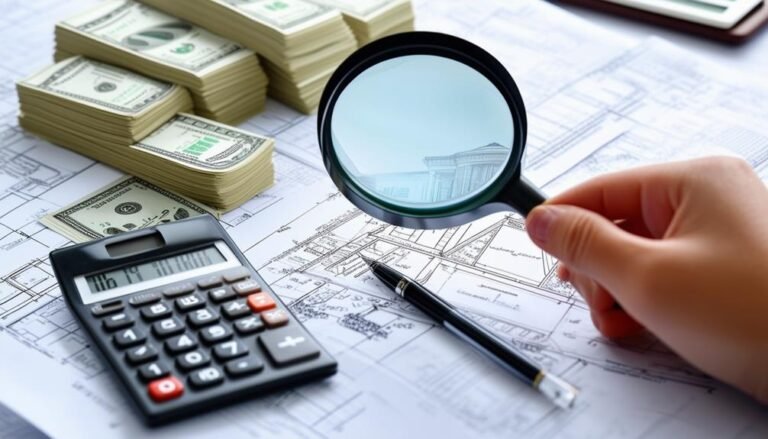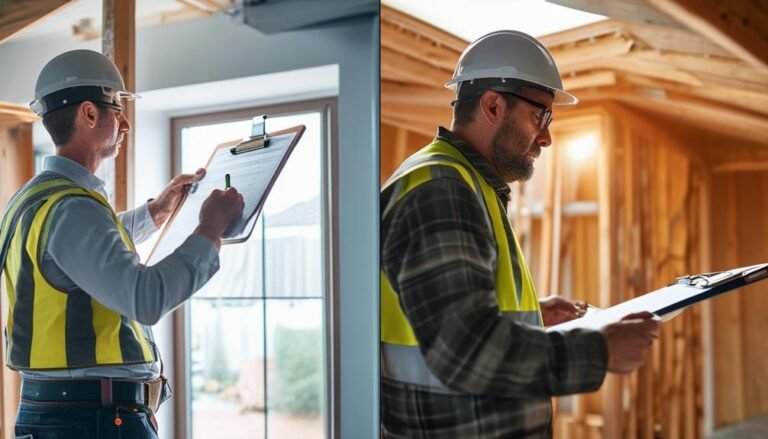When you’re buying a home, understanding the home inspection process is vital. It’s not just a routine check; it’s your chance to uncover any hidden issues that could impact your investment. Professional inspectors thoroughly examine everything from the foundation to the roof, ensuring there are no unpleasant surprises. But what exactly do they look for, and how can you be sure you’re getting a thorough assessment? Let’s explore the key components of this process and why it’s an important step in your home-buying journey.
Key Takeaways
- Home inspections identify property issues, including structural defects and safety hazards.
- Inspectors examine foundation, roof, electrical, plumbing, and HVAC systems.
- Detailed reports outline concerns, differentiate major issues from minor ones.
- Inspections help with negotiations, repairs, and informed decision-making.
- Qualified inspectors follow strict standards and provide professional evaluations.
What Is a Home Inspection?
A home inspection is a crucial step where a professional examines the property’s overall condition to identify any issues. During this process, the inspector conducts a visual examination of the structure, systems, and components of the property. This includes areas like the foundation, roof, electrical systems, plumbing, and HVAC (Heating, Ventilation, and Air Conditioning) systems. The goal is to uncover potential issues such as structural defects, safety hazards, and necessary repairs.
When you hire a professional inspector, they’ll meticulously scrutinize both the interior and exterior of the property. They’ll check for signs of water damage, inspect the attic and basement, and assess the condition of the windows and doors. This thorough review ensures that no critical area is overlooked.
It’s important to note that while professional inspectors are typically hired for this task, buyers themselves can also conduct home inspections. However, professional inspectors bring specialized knowledge and experience, which often results in a more detailed evaluation.
The information gathered from a home inspection is invaluable for making informed decisions. For buyers, it provides a clear understanding of the property’s condition, potentially saving you from unforeseen expenses. For sellers, it highlights areas that may need attention before listing the property, ensuring transparency and possibly increasing buyer confidence.
Home inspections are usually conducted before finalizing a home purchase. This timing allows all parties to address any issues or negotiate repairs, promoting transparency and peace of mind. By thoroughly examining the property, a home inspection helps guarantee that everyone involved is fully aware of the property’s true state.
Benefits of a Home Inspection
Understanding the extensive nature of a home inspection, let’s explore the significant benefits this process offers. First and foremost, a home inspection helps uncover costly repairs and safety hazards, providing you with essential information. Knowing about issues like faulty wiring, structural damage, or plumbing problems can save you from unexpected expenses and potential dangers.
This process also offers substantial leverage in negotiations. With a detailed inspection report in hand, you can address these issues with the seller, perhaps negotiating a lower price or requesting repairs before finalizing the purchase. This guarantees transparency between buyers and sellers, fostering an environment of trust and openness.
Moreover, home inspections provide peace of mind to both parties. As a buyer, you can make an informed decision, confident that you understand the property’s condition. Sellers, on the other hand, can address any issues beforehand, making their property more appealing to potential buyers.
Another significant benefit is the guidance inspection reports offer in identifying necessary repairs and potential investments. Knowing what needs attention allows you to prioritize your spending effectively and plan for future improvements, helping you maintain and potentially increase your property’s value over time.
Lastly, addressing issues found in a home inspection can increase the property’s selling price and attract more potential buyers. By resolving problems early, you enhance the home’s marketability, making it a more attractive option in a competitive real estate market.
Pre-Listing Home Inspection
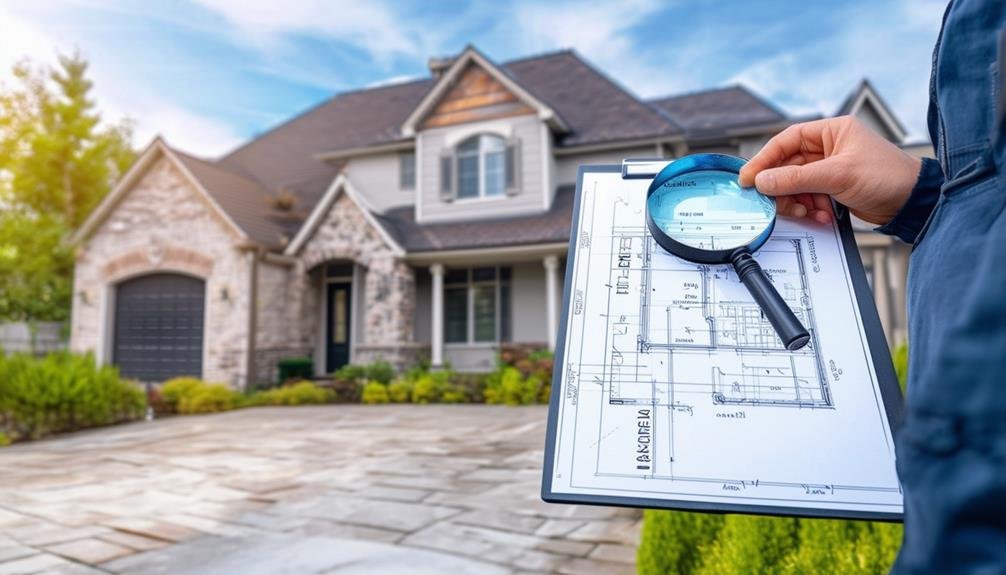
When you’re selling your home, initiating a pre-listing home inspection can uncover potential issues that might hinder your sale. By proactively addressing any discovered problems, you can enhance the appeal of your property and potentially expedite the selling process. A pre-listing inspection, conducted by a qualified inspector, allows you to identify structural, electrical, plumbing, and other significant concerns before potential buyers even step foot in your home.
Taking this step provides a strategic advantage. It enables you to make necessary repairs or updates, ensuring your home is in best condition. This can prevent last-minute surprises during the buyer’s inspection, which often lead to renegotiations or, worse, the collapse of the sale. By presenting a well-maintained property, you position yourself to attract more serious and committed buyers, who are reassured by the transparency and diligence you’ve demonstrated.
Moreover, a pre-listing inspection report can be used as a marketing tool. Sharing this report with potential buyers shows that you have nothing to hide, fostering trust and confidence. Buyers appreciate the upfront information, as it helps them make informed decisions. This level of transparency can set your property apart in a competitive market, potentially leading to quicker and smoother transactions.
Focus Areas During Inspection
During a home inspection, inspectors zero in on key areas like your home’s foundation, walls, and roof to spot any signs of damage or wear. These structural elements are critical to the integrity of your property. Inspectors will look for cracks in the foundation, signs of water damage in the walls, and missing or damaged shingles on the roof. Identifying these issues early can save you from costly repairs down the line.
Beyond the structural components, inspectors also evaluate the home’s systems. They will scrutinize the electrical system to verify it meets safety standards and check the plumbing for leaks or outdated materials. The heating and cooling systems are assessed for efficiency and proper functionality, ensuring they can adequately maintain a comfortable indoor environment.
Interior aspects, such as windows, doors, and insulation, are also on the checklist. Inspectors will examine these elements to identify any potential issues that could impact energy efficiency and comfort. For instance, they might check for drafts around windows and doors or inadequate insulation in the attic.
Externally, inspectors will consider property grading and drainage. Proper grading helps direct water away from the foundation, preventing potential water damage. They will also inspect gutters and downspouts to confirm they are in good working order.
Landscaping and outdoor elements aren’t overlooked either. Inspectors will assess the condition of pathways, driveways, and retaining walls, as well as any potential safety hazards like overgrown trees or deteriorating fences. By focusing on these areas, inspectors help secure your home is safe, functional, and efficient.
Detailed Inspection Areas
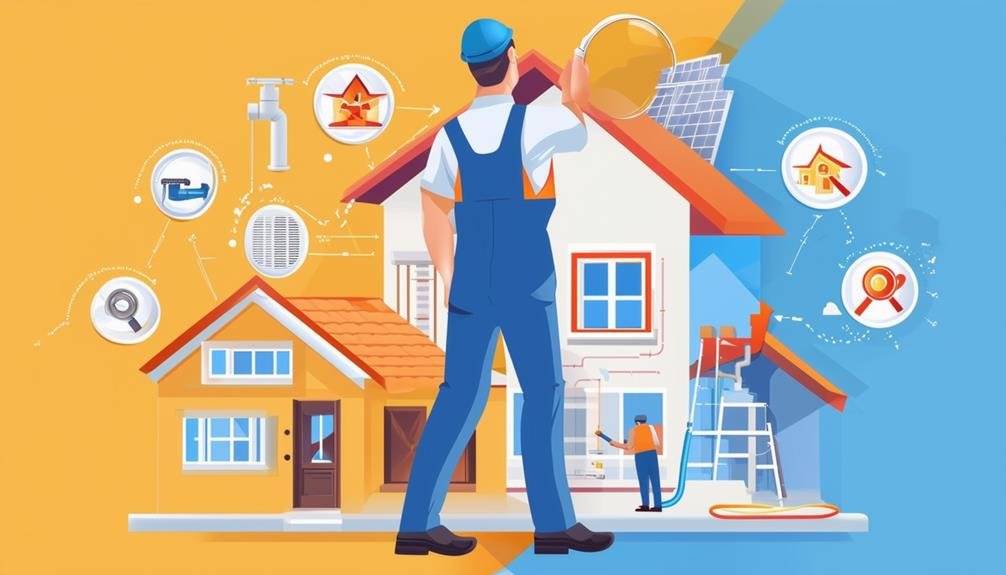
In detailed inspection areas, inspectors meticulously check for foundation damage, scrutinizing cracks, shifts, and any signs of water damage. They assess the structural integrity, looking for issues that could compromise the home’s stability. Inspectors examine structural beams, posts, joists, and rafters. Any weakening or damage in these components can greatly impact the home’s safety and longevity.
Roof conditions are another important focus. Inspectors evaluate the age and quality of shingles, ensuring they are intact and secure. They look for signs of leaks, which might indicate underlying problems. A thorough roof inspection helps determine if repairs or replacements are necessary to prevent future issues.
Plumbing systems undergo a detailed examination too. Inspectors check for leaks and assess the condition of pipes. They verify the overall functionality of the system, ensuring there are no blockages or other issues that could lead to water damage or inefficient water flow. Functional plumbing is essential to maintaining a healthy living environment.
Electrical inspections are equally important. Inspectors evaluate the safety of the electrical panel and wiring throughout the home. They check for compliance with safety standards, ensuring that all wiring is correctly installed and that circuits are protected by appropriate safety devices. This helps prevent electrical hazards that could pose significant risks to the home’s occupants.
The Home Inspection Process
Understanding the home inspection process empowers you to make informed decisions about one of the most significant investments you’ll ever make. Typically lasting around 2-3 hours, the inspection covers key components such as the roof, plumbing, electrical systems, and structural integrity. This thorough examination helps identify any potential issues that could impact the property’s value or safety.
As a buyer, attending the inspection allows you to ask questions, receive insights, and gain a better understanding of the property’s condition. This hands-on approach provides you with valuable information that can influence your purchasing decision and future negotiations. Home inspectors in Ontario do not offer repair services but will provide a detailed report outlining any concerns or issues found during the inspection.
For sellers, preparing for the inspection is essential. Ensuring easy access to all areas of the home can facilitate a smooth inspection process. Addressing minor repairs or maintenance issues beforehand can also present the home in a better light, potentially avoiding any surprises that could delay the sale.
Understanding the home inspection process is vital for both buyers and sellers. Buyers benefit by being able to make informed decisions and negotiate any necessary repairs or adjustments. Sellers can streamline the selling process by taking proactive steps to address potential issues before they become negotiation points. In both cases, a clear and thorough inspection process helps guarantee that all parties are aware of the property’s true condition, leading to more transparent and efficient transactions. This knowledge ultimately supports a smoother, more informed, and confident home-buying or selling experience.
Interpreting Inspection Reports

Once the home inspection is complete, interpreting the inspection report becomes your next important task. The report is a detailed document detailing the findings on the property’s structural integrity, systems functionality, and overall condition. It often distinguishes between major issues that require immediate attention and minor cosmetic concerns that might not need urgent fixes.
Understanding the terminology used in the report is essential for effective decision-making. For instance, terms like ‘structural defects‘ or ‘system malfunctions‘ indicate serious problems that could affect the safety and livability of the home. On the other hand, ‘cosmetic issues‘ refer to less significant concerns that might only impact the property’s aesthetic appeal.
Inspectors typically provide recommendations for repairs, maintenance, or further evaluation by specialists. It’s important to carefully review these suggestions to determine the necessary steps to address any problems. Recommendations for repairs often come with a sense of urgency, particularly if the issue poses a safety risk or could lead to more notable damage if left unattended.
You can also use the inspection report to negotiate with the seller. If major issues are discovered, you might request that the seller make repairs, provide concessions, or adjust the purchase price accordingly. This negotiation can have a significant impact on your final decision and the overall cost of the property.
Home Insurance and Inspections
A home inspection can be vital for securing the right insurance policy and making sure your property meets all necessary criteria. Many insurance companies require a home inspection to verify that the property aligns with their standards. This process helps identify potential risks and liabilities, which can impact your insurance premiums and coverage.
When an inspection report highlights issues, addressing them promptly can be critical for insurance approval. Fixing these problems not only protects your investment but also guarantees that you meet the insurer’s requirements. For example, issues like outdated electrical systems or structural damage can pose significant risks. By resolving these, you demonstrate to the insurance company that your home is a lower risk, potentially leading to better insurance terms.
Inspections play a pivotal role in determining your insurance premiums. An inspector’s findings can impact how much you pay for coverage. Homes in good condition with fewer risks generally qualify for lower premiums. Conversely, properties with numerous issues may face higher costs or even denial of coverage. As a result, making sure your home passes inspection can lead to securing the most favorable insurance policy.
Furthermore, understanding the potential risks through an inspection can help you take preventative measures. By identifying areas that need improvement, you can mitigate future problems, protecting your home and investment long-term. This proactive approach can make your property more attractive to insurers, offering peace of mind that your home is adequately covered.
Regulations and Standards in Ontario
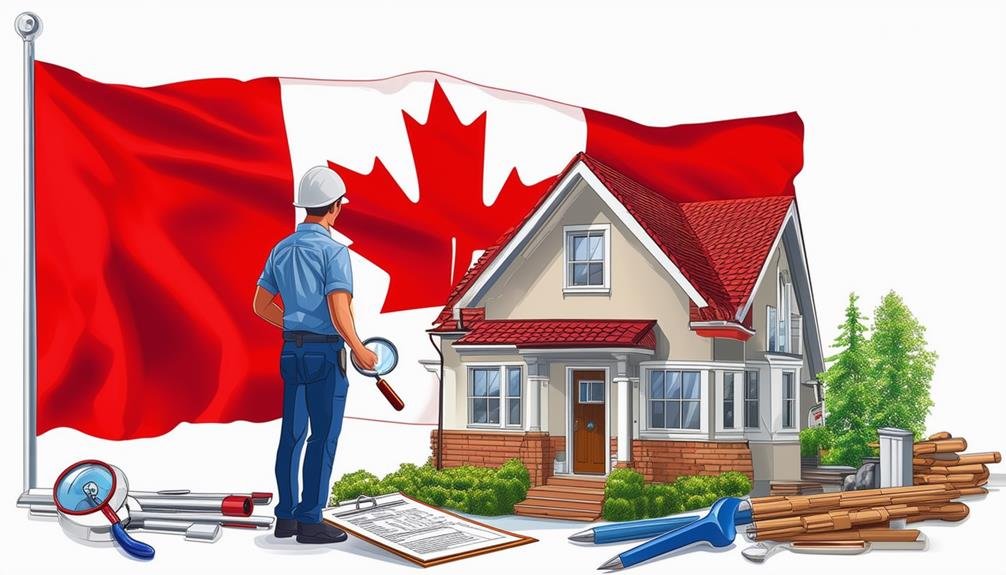
When it comes to home inspections in Ontario, aligning with reputable associations like the Ontario Association of Home Inspectors (OAHI) guarantees adherence to high standards and professional integrity. While Ontario doesn’t require home inspectors to be licensed, affiliations with organizations like OAHI guarantee a commitment to quality and professionalism. These associations enforce strict standards of practice and mandate continuing education, which helps inspectors stay current with industry trends and techniques.
Choosing an inspector affiliated with OAHI can provide peace of mind, knowing that they’re dedicated to rigorous standards. OAHI members follow a detailed code of ethics and standards of practice, ensuring that the inspection process is thorough and reliable. This affiliation is particularly important in a province like Ontario, where specific licensing requirements are not in place.
Here are three reasons why you should opt for an inspector aligned with a reputable association like OAHI:
- Professionalism: Inspectors within these associations are held to high ethical standards, guaranteeing that your inspection is conducted with integrity.
- Expertise: Continuous education requirements mean that OAHI members are always up-to-date with the latest in home inspection practices and technologies.
- Reliability: Affiliated inspectors follow established standards of practice, offering a consistent and thorough inspection process.
Common Issues Identified
During a home inspection, you’ll often find common issues like roofing problems, outdated electrical wiring, and plumbing leaks. Roof inspections frequently reveal damaged shingles or leaks, which can lead to significant water damage if not addressed promptly. Inspectors meticulously check the roof’s condition to identify any areas that may need repair or replacement.
Outdated electrical wiring is another prevalent issue. Homes with old wiring systems may not meet current safety standards, posing fire hazards or causing frequent electrical failures. Inspectors look for signs of such outdated wiring, including frayed insulation or improperly grounded outlets.
Plumbing leaks are also routinely discovered during inspections. These leaks may stem from faulty pipes, worn-out seals, or outdated fixtures. A thorough inspection includes examining all visible pipes, checking for moisture stains, and testing water pressure to verify the plumbing system is in good working order.
Structural concerns, like foundation cracks or shifts, are critical issues that inspectors are vigilant about. These problems can compromise the integrity of the entire house, leading to potentially costly repairs. Inspectors assess the foundation and look for any signs of cracking, bowing, or water intrusion.
HVAC deficiencies are common findings as well. Inefficient systems or inadequate maintenance can lead to poor indoor air quality and higher energy bills. Inspectors examine the HVAC system’s components, including the furnace and air conditioning units, to confirm they are operating efficiently and have been properly maintained.
What Should I Expect During a Home Inspection as a Seller?
When conducting a seller’s home inspection, the seller should expect a thorough examination of their property. Inspectors will inspect the exterior, interior, plumbing, electrical systems, and more. Sellers should ensure that their home is well-maintained and address any potential issues beforehand to streamline the process.
Selecting a Qualified Inspector
Choosing a qualified inspector is the next step to guarantee that any potential issues identified during the home inspection are thoroughly and accurately assessed. Selecting an experienced and reputable home inspector is important for a reliable inspection process. Here are some essential steps to make sure you select the right professional for the job.
First, look for inspectors affiliated with reputable associations like the Ontario Association of Home Inspectors (OAHI). These associations require their members to adhere to strict standards of practice and ongoing education. Inspectors who belong to such organizations are more likely to provide high-quality inspections, as they follow stringent guidelines and stay updated on industry advancements.
Second, verify the inspector’s qualifications and experience before hiring. Ask for their credentials, including certifications and licenses. Inquire about their years of experience in the field and the number of inspections they have conducted. A well-qualified inspector with extensive experience is more skilled at identifying potential issues and providing accurate assessments.
Third, make sure that the inspector adheres to strict standards of practice. Reputable associations, like OAHI, have established thorough guidelines that inspectors must follow. These standards cover various aspects of the inspection process, ensuring a detailed and consistent evaluation of the property.
Here’s a quick summary to help you remember:
- Affiliation with reputable associations: Ensures compliance with high standards and ongoing education.
- Verification of qualifications and experience: Confirms the inspector’s ability to perform a thorough and reliable inspection.
- Adherence to strict standards of practice: Ensures a consistent and detailed evaluation.
Conclusion
Finally, carrying out a thorough home inspection is essential for uncovering important issues and guaranteeing safety. By diligently examining every part, from the base to the top of the house, you can save significant amounts and secure peace of mind. Choosing a knowledgeable inspector, well-versed in Ontario’s regulations, guarantees completeness and openness. Do not overlook this crucial step; a detailed inspection provides valuable information, identifies flaws, and influences your decision-making, ultimately protecting your substantial investment.
Are you ready to make your home-buying journey in North York smooth and stress-free? Trust the experts at Realtor North York – The Fan Team! Our experienced real estate agents are here to guide you every step of the way, from thoroughly understanding the home inspection process to securing your dream home.
Contact The Fan Team today and let us help you identify potential issues, negotiate repairs, and make informed decisions with confidence. Don’t leave your biggest investment to chance—partner with North York’s trusted real estate professionals.





